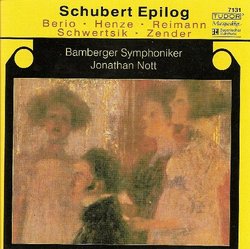| All Artists: Luciano Berio, Hans Werner Henze, Aribert Reimann, Kurt Schwertsik, Hans Zender, Jonathan Nott, Bamberg Symphony Chorus Title: Schubert Epilog Members Wishing: 1 Total Copies: 0 Label: Tudor Release Date: 1/1/2004 Genre: Classical Styles: Opera & Classical Vocal, Chamber Music, Historical Periods, Modern, 20th, & 21st Century Number of Discs: 1 SwapaCD Credits: 1 UPC: 812973011316 |
Search - Luciano Berio, Hans Werner Henze, Aribert Reimann :: Schubert Epilog
 | Luciano Berio, Hans Werner Henze, Aribert Reimann Schubert Epilog Genre: Classical
|
Larger Image |
CD Details |
CD ReviewsThe ghost of Scubert clothed in modernist garb -- fascinatin Santa Fe Listener | Santa Fe, NM USA | 06/12/2009 (5 out of 5 stars) "This is a clever concept album that provides the tail end, or Epilogue, to Schubert's symphonic career. Upon the basis of sketches and scraps some diverse modern composers have built intriguing works that lie somewhere between completions and homages:
Luciano Berio -- Rendering Hans Werner Henze -- Erlkonig Aribert Reimann Metamorphosen fiber em Menuett von Franz Schubert (D600) Schubert/Zender -- Coronach, D836. Gondelfabrer, D809. Nachthelle, D8922. Psalm 23, D706 Kurt Schwertsik -- Epilog zu 'Rosamunde' Berio's "Rendering" takes Schubert's remaining notes for a Tenth Sym. and interpolates them very skillfully and evocatively with his own sympathetic modern additions, all in a delicate, even ghostly style. This work has been recorded several times, but of the three versions I know, Nott's is the best in terms of execution and real brio. At the other extreme, Hans Zender has done a conventional job arranging a handful of Schubert lieder for orchestra and either men's or women's chorus. The sound of a vibraphone, chimes, and celestra is fairly weird in the mix, and the overall tone is a bit too sugary, but the results are certainly listenable. "Nachthelle" D. 892, led by a tenor soloist, is the most dramatic and spooky of the four songs. Instead of juxtaposing old and new, as Berio did, Reinemann states Schubert's fairly nondescript minuet and then sets off for 8 min. on a modernist course all his own, the result sounding fairly true to Schubert, somehow, since there is always a hint of the original. But you won't hear any of Schubert's Erlkonig in Henze's balletic tribute, which the Gramophone rightly describes as a "densely exhilarating Scherzo." Schwertsik's moody Epilog to Rosamunde, from which the album gets its title, is infiltrated with Schubertian fragments, and like all the modernist works chosen, it's eloquent and thoroughly enjoyable. If you're willing to take a mild chance and also love Schubert's music, these loving tributes make a worthy exploration that bridges two centuries very evocatively." |

 Track Listings (10) - Disc #1
Track Listings (10) - Disc #1